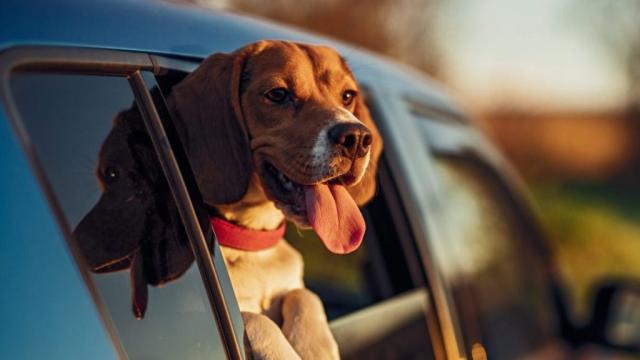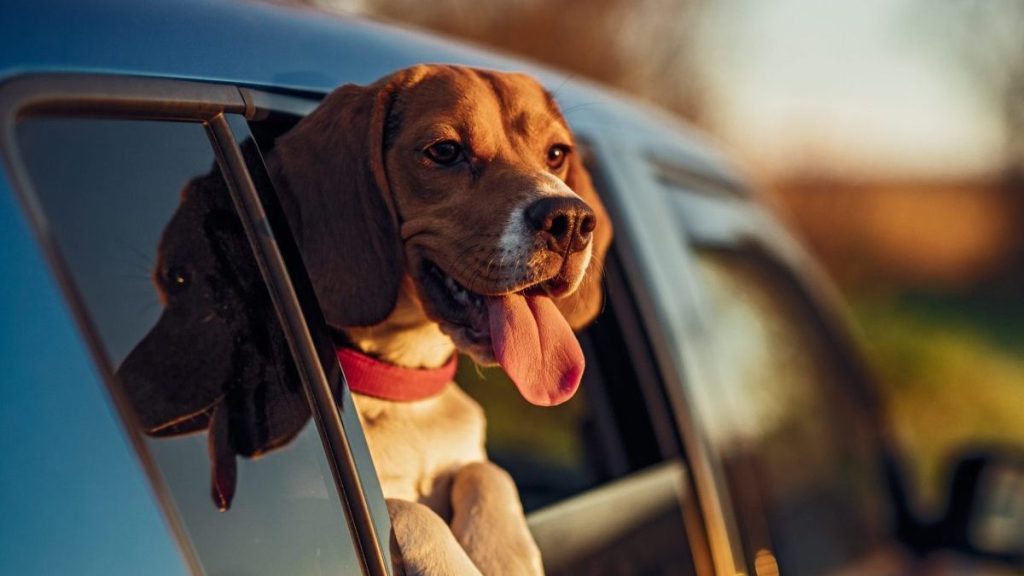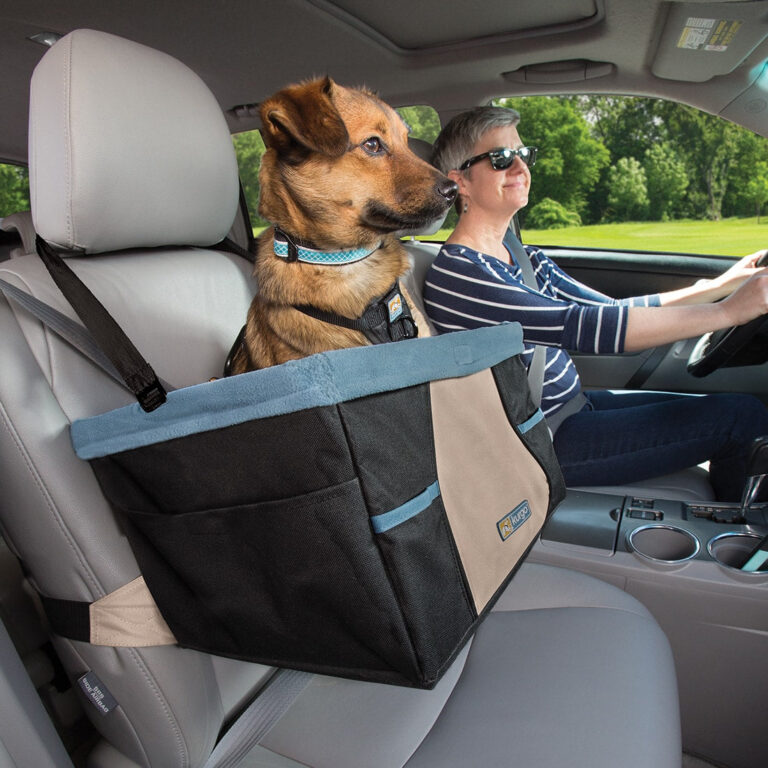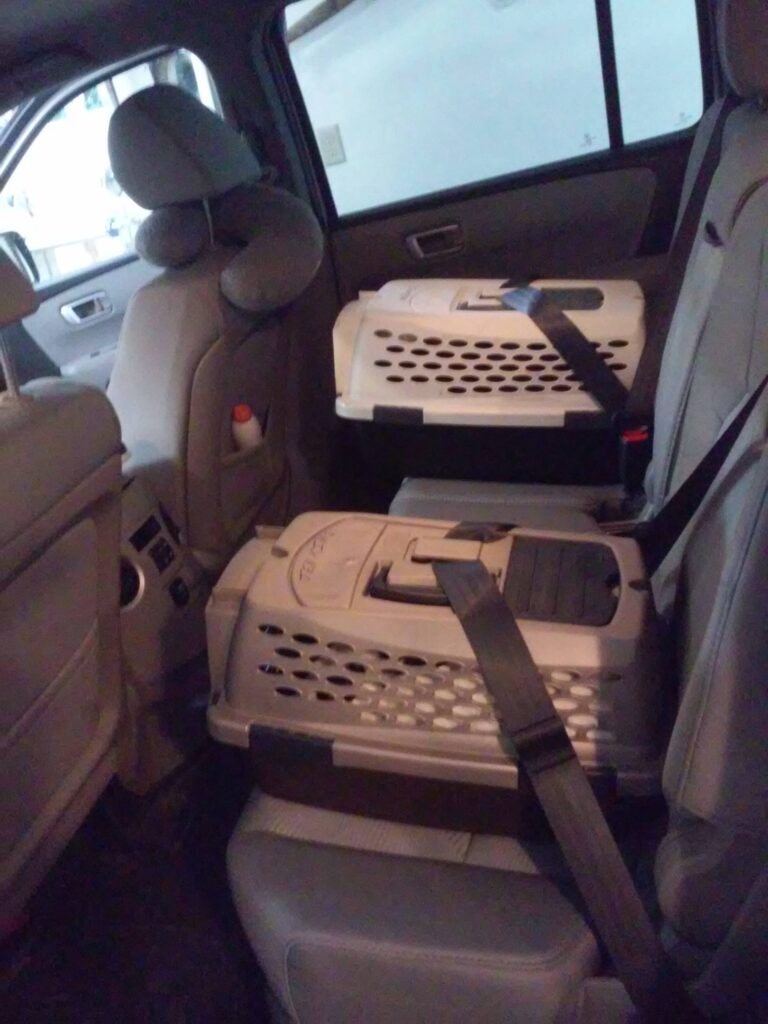What Dog Breeds are Prone to Car Sickness? Unveiled Secrets
Certain dog breeds prone to car sickness include Labrador Retrievers, Boxers, and Dalmatians. Symptoms vary among breeds.
Dogs that may experience anxiety or have sensitive stomachs are more likely to suffer from motion sickness during car rides. Labrador Retrievers, Boxers, and Dalmatians are among the breeds that commonly exhibit car sickness symptoms. These may include drooling, vomiting, restlessness, and whining.
Understanding which breeds are more susceptible to motion sickness can help pet owners take necessary precautions and make car journeys more comfortable for their furry companions.

Credit: www.yahoo.com
Introduction To Canine Car Sickness
Car sickness is not just limited to humans; dogs can also experience motion sickness while traveling in a car. Some dog breeds are more prone to car sickness than others due to various factors such as their physiology and anxiety levels. Understanding the symptoms and reasons behind canine car sickness can help pet owners take necessary precautions and provide comfort to their furry companions during car rides.
Symptoms Of Motion Sickness In Dogs
When it comes to identifying motion sickness in dogs, there are several common symptoms to look out for:
- Excessive drooling
- Vomiting
- Whining or restlessness
- Pacing or inability to settle
- Panting and trembling
These signs may indicate that your dog is experiencing discomfort during car rides.
Why Some Dogs Experience Car Sickness
Understanding the reasons behind canine car sickness can help pet owners take proactive measures to minimize their dog’s discomfort. Factors that contribute to car sickness in dogs include:
- Inner ear problems affecting balance
- Anxiety or fear associated with car travel
- Sensitivity to motion and visual stimuli
- Previous negative experiences during car rides
These factors can vary from one dog to another and may require different approaches to alleviate car sickness.

Credit: www.scotsman.com
The Role Of Genetics In Car Sickness
Breeds With A Higher Incidence Of Motion Sickness
Certain dog breeds are more prone to car sickness due to their genetics. Breeds with shorter snouts and flatter faces, such as Bulldogs, Boxers, and Pugs, are more susceptible to motion sickness because of their unique facial structure. The conformation of their noses and throats can restrict airflow, leading to an increased likelihood of experiencing car sickness.
The Connection Between Ear Structure And Motion Sickness
Dogs with pendulous ears, such as Spaniels and Retrievers, are also more likely to suffer from car sickness. Their ear structure can disrupt their sense of balance and make them more sensitive to motion, contributing to their susceptibility to car sickness.
Top Breeds Prone To Motion Sickness
Certain dog breeds are more prone to motion sickness than others. Breeds such as Dachshunds, Greyhounds, and Bernese Mountain Dogs are known to suffer from car sickness due to their sensitive stomachs and inner ears.
If you’re planning a road trip with your furry friend, it’s essential to consider their susceptibility to car sickness. Motion sickness in dogs can lead to discomfort, anxiety, and even vomiting during car rides. While individual dogs can vary in their sensitivity to motion, certain breeds are more prone to experiencing car sickness than others. Understanding which breeds are more susceptible can help you take necessary precautions and make your pup’s journey more enjoyable.Small Breeds And Car Sickness
Small dog breeds are often known for their adorable size, but some of them are unfortunately more prone to car sickness. Here are a few small breeds that may experience motion sickness more frequently: 1. Chihuahua: These pint-sized pups are not only known for their big personalities but also for their tendency to get car sick. Their delicate constitution and sensitivity to motion make them more susceptible to experiencing discomfort during car rides. 2. Yorkshire Terrier: Despite their confident and lively nature, Yorkies can easily succumb to car sickness. Their small size and high energy levels can contribute to their susceptibility to motion sickness. 3. Maltese: These elegant and affectionate companions are prone to car sickness due to their sensitive stomachs. Their dainty size and delicate digestive system can make car rides a less pleasant experience for them.Large Breeds With A Tendency For Motion Sickness
While car sickness is commonly associated with small dog breeds, it can also affect larger breeds. Here are a few larger breeds that may be more prone to motion sickness: 1. Labrador Retriever: Labradors are renowned for their friendly nature and love for adventure. However, their inclination towards motion sickness can make car rides a bit challenging. It’s important to take precautions and make their journey as comfortable as possible. 2. German Shepherd: Despite their strong and confident demeanor, German Shepherds can be susceptible to car sickness. Their large size and active nature can contribute to their sensitivity to motion during car rides. 3. Great Dane: Known for their impressive stature, Great Danes may experience motion sickness due to their size. The gentle giants may need extra care and attention to ensure their comfort during car travels. Remember, every dog is unique, and not all breeds within these categories will experience car sickness. However, being aware of the breeds that are more prone to motion sickness can help you prepare accordingly and make your furry friend’s journey a smoother one. Whether it’s providing proper ventilation, keeping them calm, or consulting with your veterinarian for potential remedies, taking proactive steps can ensure a more enjoyable experience for both you and your beloved canine companion.
Credit: dogtime.com
Age-related Susceptibility In Dogs
Certain dog breeds are more susceptible to car sickness due to their age-related vulnerabilities. These breeds include Boxers, Bulldogs, Dalmatians, and Poodles. It’s important to take precautions and make travel arrangements accordingly to ensure the comfort and well-being of these dogs during car rides.
Puppies And Motion Sickness: A Temporary Issue?
Young dogs may experience car sickness due to their developing inner ear balance mechanisms.Does Age Increase Car Sickness In Certain Breeds?
Senior dogs of brachycephalic breeds are more prone to car sickness. Age plays a significant role in a dog’s susceptibility to car sickness. Puppies, due to their developing vestibular systems, may experience motion sickness temporarily. Older dogs, especially brachycephalic breeds, are more prone to car sickness. Age-related factors can impact a dog’s susceptibility to motion sickness. As dogs age, their inner ear balance mechanisms may become less effective. Brachycephalic breeds like Bulldogs and Boxers are more prone to car sickness. Factors such as breed and age can influence a dog’s likelihood of experiencing car sickness. Senior dogs of certain breeds may be more susceptible to motion sickness.Anatomical And Physiological Factors
When it comes to car sickness in dogs, there are several anatomical and physiological factors that can contribute to their susceptibility. Understanding these factors can help dog owners better manage their pets’ motion sickness and make car rides a more pleasant experience for everyone involved.
Head Shape And Its Impact On Motion Sickness
The shape of a dog’s head can play a significant role in their susceptibility to car sickness. Dogs with short snouts, such as Bulldogs and Pugs, often have compressed airways and narrower nasal passages. This anatomical feature can lead to breathing difficulties, which can exacerbate motion sickness symptoms. Additionally, these breeds may have a more sensitive inner ear due to their head structure, making them more prone to balance issues and nausea during car rides.
The Vestibular System’s Role In Balance And Sickness
The vestibular system, located in the inner ear, is responsible for maintaining a dog’s balance and spatial orientation. It consists of fluid-filled canals and tiny sensory receptors that send signals to the brain about the body’s position in space. Dogs with a more sensitive vestibular system may be more prone to motion sickness because their brain receives conflicting signals from the inner ear and visual cues.
The vestibular system also plays a crucial role in preventing nausea and vomiting. When the body is in motion, the vestibular system helps to stabilize the eyes and maintain a sense of equilibrium. However, in dogs with a less efficient vestibular system, this stabilization process may be disrupted, leading to dizziness, nausea, and ultimately, car sickness.
It’s important to note that while certain dog breeds may be more predisposed to car sickness due to their head shape or vestibular system sensitivity, individual variations within each breed also exist. Some dogs may have a higher tolerance for car rides despite their breed’s general predisposition.
To help alleviate car sickness in dogs, various strategies can be employed, such as acclimating them to car rides gradually, providing proper ventilation, using motion sickness medications prescribed by a veterinarian, and ensuring a comfortable and secure travel environment.
By understanding the anatomical and physiological factors that contribute to car sickness in dogs, owners can take proactive steps to minimize discomfort and make car travel a more enjoyable experience for their four-legged companions.
Behavioral Traits And Stress Responses
Certain dog breeds, such as Labradors and Beagles, are more prone to car sickness due to their sensitive stomachs and high anxiety levels. These behavioral traits can trigger stress responses during car rides, leading to nausea and discomfort in susceptible breeds.
Anxiety-related Car Sickness In Dogs
Some dog breeds are more prone to car sickness than others, and it’s not just because of physical factors like inner ear issues or motion sensitivity. Behavioral traits and stress responses can also play a role in a dog’s tendency to get car sick. Anxiety is a common cause of car sickness in dogs. If a dog feels stressed or anxious while traveling in a car, it can trigger a physiological response that leads to nausea and vomiting. Dogs that are not used to car travel or have had negative experiences in the past may be more prone to anxiety-related car sickness.Training And Conditioning To Reduce Car Sickness
Fortunately, there are steps that pet owners can take to help reduce car sickness in dogs. Training and conditioning can be effective in helping dogs overcome anxiety and stress related to car travel. One approach is to gradually acclimate the dog to car travel by taking short trips and gradually increasing the distance and duration of the trips over time. This can help the dog feel more comfortable and less anxious in the car. Other strategies include using calming aids like pheromone sprays or supplements, providing a comfortable and familiar environment in the car, and avoiding feeding the dog right before travel. By understanding the behavioral traits and stress responses that can contribute to car sickness in dogs, pet owners can take proactive steps to help their furry friends feel more comfortable and relaxed on car trips.Preventive Measures And Remedies
When it comes to traveling with your furry friend, car sickness can be a common concern for many dog owners. Fortunately, there are preventive measures and remedies that can help alleviate the symptoms and make the journey more comfortable for your pup.
Dietary Adjustments Before Travel
Feeding your dog a light meal a few hours before the trip can help reduce the chances of car sickness. Avoid heavy or rich foods that could upset their stomach. Additionally, limiting their water intake before the journey can also help prevent nausea.
Medications And Natural Supplements
If your dog experiences severe car sickness, consulting your veterinarian about medications or natural supplements may be beneficial. Prescription medications such as Cerenia or over-the-counter options like Benadryl can help alleviate symptoms. Natural remedies like ginger or chamomile can also be effective in calming your dog’s stomach.
Consulting With A Veterinarian
Consulting with a veterinarian is crucial if your dog experiences car sickness. A veterinarian can provide valuable insights and guidance to help alleviate your dog’s discomfort during car rides. They can offer tailored advice based on your dog’s specific needs and health history.
When To Seek Professional Advice
If your dog’s car sickness is severe and persistent, it’s essential to seek professional advice from a veterinarian. Additionally, if your dog exhibits signs of distress, such as excessive drooling, panting, or vomiting during car rides, consulting with a veterinarian is recommended to address the issue effectively.
Customized Treatment Plans For Your Dog
Veterinarians can create customized treatment plans for your dog to manage car sickness. These plans may include medications, behavioral modification techniques, and dietary adjustments tailored to your dog’s specific needs. Your veterinarian can guide you through the implementation of these plans and provide ongoing support to monitor your dog’s progress.
Frequently Asked Questions
What Causes A Dog To Be Carsick?
Car sickness in dogs can be caused by a variety of factors, such as anxiety, motion sensitivity, or unfamiliarity with car travel. It is important to gradually acclimate your dog to car rides, provide a comfortable and secure environment, and consider using calming techniques or medications recommended by a veterinarian.
What Age Do Dogs Stop Getting Car Sick?
Dogs usually outgrow car sickness by 1 to 2 years old. Puppies may experience it, but it often improves with age.
Do Some Dogs Never Get Over Car Sickness?
Some dogs may never outgrow car sickness. It can be due to anxiety or motion sensitivity. Try desensitization techniques and consult a vet for solutions.
What Is The Best Product For Dog Car Sickness?
The best product for dog car sickness is calming chews or tablets formulated with natural ingredients.
Conclusion
Based on the research, it is clear that some dog breeds are more prone to car sickness than others. It is important for dog owners to be aware of this and take necessary precautions when traveling with their furry friends.
By understanding the symptoms and causes of car sickness in dogs, and taking the necessary steps to prevent it, owners can ensure a safe and comfortable journey for their pets. Remember to consult with a veterinarian for any concerns or questions related to your dog’s health.
- Can I Get in a Taxi Without a Car Seat? - January 26, 2025
- Can I Get Chlamydia From a Toilet Seat? - January 26, 2025
- Can I Get an Uber With a Car Seat? - January 26, 2025






